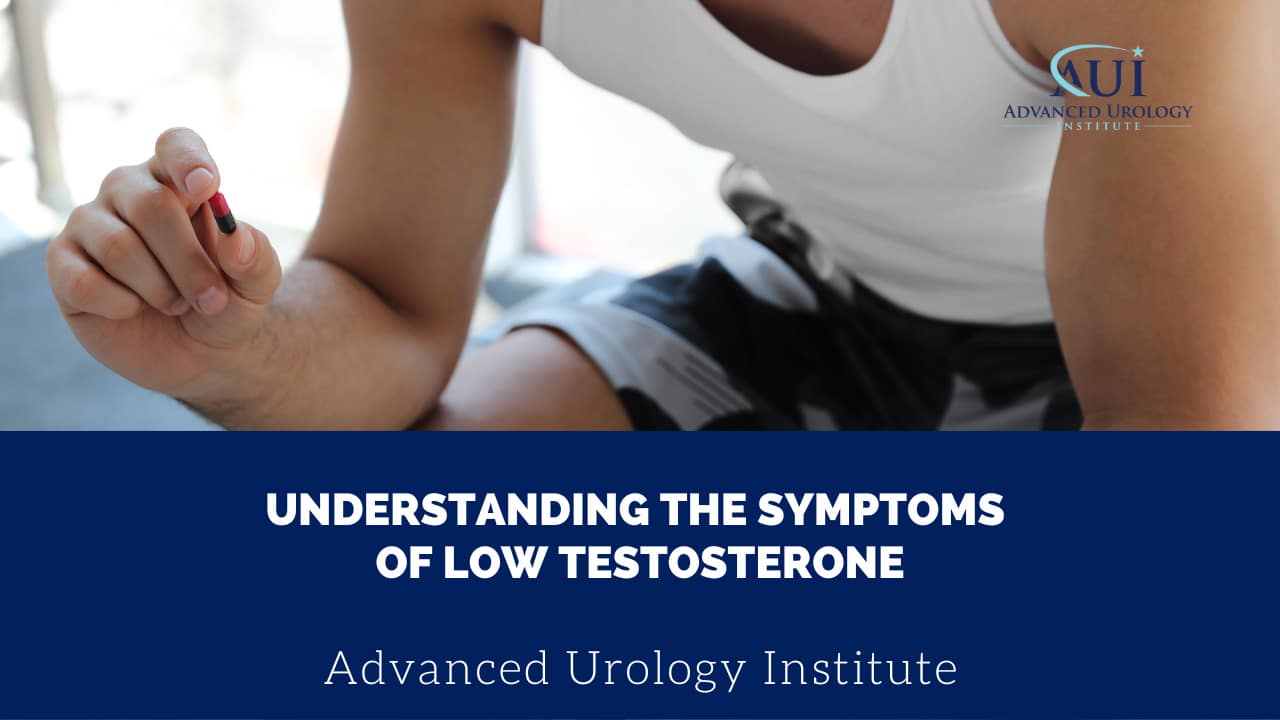Understanding the Symptoms of Low Testosterone
3 Key Takeaways:
- Low testosterone may be indicated by physical exhaustion, decreased sexual appetite, erectile dysfunction, fatigue, and weight gain.
- It is important to recognize and understand these symptoms, as they are integral in diagnosing and addressing the issue of low testosterone.
- The Advanced Urology Institute in Largo and Palm Harbor, FL, is a beacon of hope for individuals experiencing symptoms of low testosterone.
https://www.youtube.com/watch?v=wLtQjEmYoxM
 Picture this: you’re hitting the gym regularly, but not reaping the benefits. Even though you’re putting in the work, you’re constantly feeling fatigued. You’re unable to stir up the same vigor for life. Your sex drive is dwindling. If this describes how you’re feeling, it’s time to consider the possibility of low testosterone.
Picture this: you’re hitting the gym regularly, but not reaping the benefits. Even though you’re putting in the work, you’re constantly feeling fatigued. You’re unable to stir up the same vigor for life. Your sex drive is dwindling. If this describes how you’re feeling, it’s time to consider the possibility of low testosterone.
In Largo, FL, and Palm Harbor, FL, two of the largest cities in the Sunshine State, urologists at the Advanced Urology Institute are seeing a wave of such cases. The symptom load is typically a dire combination of fatigue, low sexual desire, and lack of progress despite exercising. Incredulously, as Dr. M. Scott Klavans, a board-certified urologist, has observed, many patients continue to ignore these symptoms and the underlying issue that plagues them. “And we see a lot of patients with low testosterone…Patients [are] working out a lot and unable to really see any benefit from that,” Klavans notes, echoing the sentiment.
Symptoms and Stigma
It’s not just physical exhaustion or decreased sexual appetite that could hint at low testosterone. In fact, the symptoms are multifold. As Dr. Christopher M. Sherman, another board-certified urologist explains, “The signs of low testosterone people can have are issues with erections, decreased libido, fatigue, [and] weight gain.” It’s high time individuals recognize and understand these symptoms, as they are integral in diagnosing and addressing the issue of low testosterone.
Many patients are in denial or bound by the stigma that revolves around low testosterone, which often clouds their judgment. It is essential to understand that identifying these symptoms isn’t indicative of any weakness or deficiency. Rather, it’s an opportunity to spot a medical condition that might be affecting your overall health and wellbeing.
Choosing to Act
Once symptoms have been recognized, the next step is to get a check-up. The urologists at the Advanced Urology Institute in Largo and Palm Harbor, FL, are experts in diagnosing and managing low testosterone. They will run several tests to measure your testosterone levels and determine a course of action. “We check the testosterone, if that’s low, then we can offer different options for testosterone replacement,” assures Dr. Sherman.
Advanced Urology Institute: A Beacon of Hope
As the largest urology practice in Florida, the Advanced Urology Institute stands as a beacon of hope for individuals experiencing symptoms of low testosterone. Their seasoned urologists in Largo, FL, and Palm Harbor, FL, are committed to providing comprehensive, patient-centered care. If you suspect that you’re suffering from low testosterone, reach out to the experts at the Advanced Urology Institute. The only way to regain the quality of life you deserve is by taking action now.
Understand the symptoms, shed the stigma, and make the choice to act. Low testosterone is not a life sentence. With the Advanced Urology Institute on your side, you can regain control of your health and relish the energy and vitality that life has to offer.
References:
- “Low Testosterone: Symptoms, Diagnosis & Treatment.” https://www.urologyhealth.org/urology-a-z/l/low-testosterone.
- “Could you have low testosterone?: MedlinePlus Medical Encyclopedia.” 12 May. 2023, https://medlineplus.gov/ency/patientinstructions/000722.htm.
- “Testosterone therapy: Potential benefits and risks as you age.” https://www.mayoclinic.org/healthy-lifestyle/sexual-health/in-depth/testosterone-therapy/art-20045728.
Transcription:
M. Scott Klavans, MD (Board Certified Urologist at Largo, FL and Palm Harbor, FL):
And we see a lot of patients with low testosterone. I always tell patients it’s not going to make you feel like you’re 18 again. Feeling fatigue, low sex drive, those are the two biggest things that we see. Patients that are working out a lot and unable to really see any benefit from that. And again, it really comes down to the erections, the low libido, and really the energy level.
Christopher M. Sherman, MD (Board Certified Urologist at Largo, FL):
Low testosterone is another common thing we see in the office. We see that a lot. The signs of low testosterone people can have are issues with erections, decreased libido, fatigue, weight gain. So generally what we do is we check the testosterone, if that’s low, then we can offer different options for testosterone replacement.

